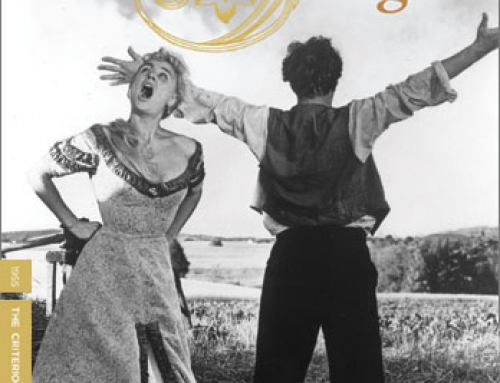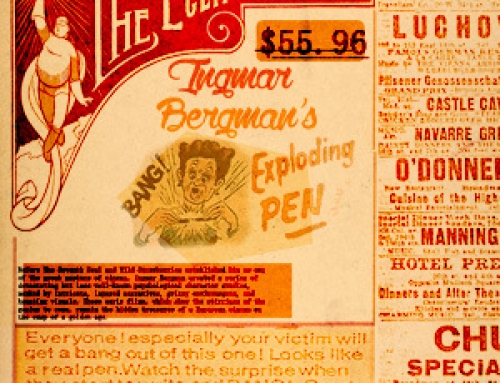I know for many of my friends around the world, this has been a harsh winter that isn’t yet letting up, though spring is just three weeks away. In my neck of the woods, we might think spring has already arrived. It’s been sunny, and the snow has melted. As I write this, there’s a fresh rain falling outside. With the promise of warmth out my window lifting my spirits, it feels a bit untimely to post about Ingmar Bergman’s Winter Light (1962), but perhaps this warm weather is just setting me up. In any case, I have been waiting to do this post ever since my first of (so far) six Bergman posts. I’ve been building up to this one. Cold and quiet, Winter Light is one of my top three favorite films — perhaps it’s my favorite film.

This is the first Bergman film I ever saw. I’d heard about The Seventh Seal, but it was this title — Winter Light — that stood out when I was at a wonderful local library looking at their Bergman films. The original Swedish title actually translates to “The Communicants,” which is an important theme I will touch on below, but before getting into the film itself I’d like to talk about what the English title “Winter Light” suggests to me.
Light in winter is cold and rare. Weeks of cloud cover make the world gloomy, and the light is dark. The promise of more light to come does little; it’s hard to hope. It is hard to see. The prior film in this loose “trilogy” was Through a Glass Darkly, which to me suggests some of the same problems. And yet, in the winter we have some of the brightest days, and the light can be unforgiving. Stripped of the warm yellows and reds it can feel stripped of illusion. We might feel we can see too well. It’s an uncomfortable time of existential crisis.

The basic story of Winter Light comes from Bergman’s own experiences, which he shared with his assistant Vilgot Sjöman, as recounted in the essay included in the Criterion edition DVD:
In 1959, my wife and I went to say hello to the pastor who had married us. On the way, in the village shop, we saw his wife talking very seriously to a schoolgirl. When we reached the vicarage, the pastor told us that this little girl’s father had just committed suicide. The pastor had had several conversations with him earlier, but to no avail.
According to that same essay, the story developed further while Bergman was scouting locations and soaking in the atmosphere of the churches he planned to use. He asked his father, a strict Lutheran pastor to accompany him. That day, the presiding pastor said he was ill and would not be able to hold the full service. Bergman’s father stood up, got dressed, and helped out, the idea being that the service must go on, no matter how anyone is feeling. This is what it means to lead a flock.
And despite sickness, dread, doubt, bitterness, panic, the service does go on for the central character in Winter Light, the Lutheran pastor Tomas Ericsson, played to perfection by Gunnar Björnstrand, one of my favorite actors I’ve brought up in almost all of the previous Bergman posts. Here he is in my favorite role:

Mimicking his character’s need to go on performing, even while miserable, Björnstrand was apparently very sick while filming Winter Light. He finished the role under doctor’s care.

It’s an early service in the local church, and almost no one has come to attend. To make matters more dire for the man in charge, most of those in attendance are not really there because of any inner conviction. On the far left of the picture above kneels Märta Lundberg (Ingrid Thulin). She does not believe in God. She’s at service because she is in love with Tomas. Next to her is Karin Persson (Gunnel Lindblom) and then her husband Jonas Persson (Max von Sydow). They are at this service because Jonas is having his own existential crisis. He doesn’t believe God could exist and preside over a world that has and has used the atomic bomb. More than that, though, Jonas does not want to exist in such a world. He has no hope and no desire to continue. Karin has brought her husband for comfort and counsel. They have three children and another on the way. When the Perssons meet with Tomas after service, Jonas lets his wife do most of the talking.

Tomas tries to talk to them, but ends up simply repeating the same things he’s been saying to so many people who must have come before. It’s all rote, and he knows it. He feels nothing. His flock is leaving, and he doesn’t blame them, yet he has nothing else.
At least, he believes he has nothing else. Since he was widowed — which may have instigated his crisis of faith, his anger at and ultimately disbelief in a God who stands by and does nothing when his faithful servant’s wife is dying — he has been receiving the caring attention of the local schoolteacher Martä.

She wants him to love her. It’s she who cares for his sickness, making him warm drinks and giving him his medicine. And, perhaps consequently, to Tomas Märta has come to represent all that is physical and fallen. He doesn’t believe in God anymore, yet he can’t get beyond his belief that the disappointing world around him is fallen.

But fallen from what? From some transcendent state? He doesn’t believe that anymore. So he doesn’t believe in anything.

He has been abandoned, by his God and now by his own idea of self and existence.
Abandonment, for me, is one of the strongest themes in the film. One of the most poignant monologues in this quiet film comes from Tomas’s assistant Algot Frövik (Allan Edwall). Algot is physically handicapped and says that, in his humble way, he has suffered physically as much as Jesus Christ. Where Christ’s suffering on the cross must have been awful, at least it was over in a few hours. Algot has been suffering for a lifetime already longer than Christ’s, and he has no idea when it will end. Yet Algot is not trying to minimize Christ’s suffering — Algot is the most faithful person in the film — he’s trying to explain where true suffering comes from: abandonment. He thinks Christ’s true suffering must have come when he felt that God had abandoned him.
Tomas must agree. As I mentioned above, he felt abandoned by God when God did nothing to save his wife from dying. Like Jonas Persson, Tomas does not know what the point is any more. To him, everything he stood for — still stands for — has turned out to be false. He has been abandoned by purpose.
Abandonment comes again in the tragedy of Jonas’s suicide. Jonas’s dread is most often remarked upon, and we do a disservice to his wife and three — almost four — children when we ignore the fact that they have to carry on in this world without this man they were supposed to be able to rely on.
So what does it mean to carry on? Each character in this film must either end things or carry on. Algot, with his physical pain; Karin and her children, without Jonas; Märta, with Tomas, who has been absolutely cruel to her — she must carry on. And Tomas, with his doubt, with his responsibilities to somehow comfort those who seek comfort where he believes there is none.
Or does he really believe there is none? I don’t have a lot to say about it, but to be abandoned means someone who was there. To complain that God did nothing means he could have done something. Perhaps Tomas still believes in a God, but since his wife’s death he has not felt that that God has cared and is, therefore, not worth caring about. And yet he carries on.








Favorite film – rough stuff for a favorite! It is sure a good one.
when jonas comes to talk to thomas
for reassurance that god could exist in a nuclear atrocity world..thomas can only speak of his own dissolutionment..”gods silemce”
after the death of his wife which
leads jonas to blow his brains ouy..
thomas the priest suffers enormous g
guilt afterwards.
“a problem shared
is a problem doubled”.